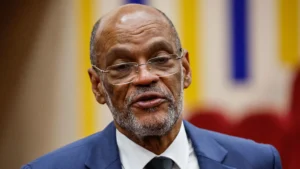
A ceasefire deal in Gaza that would see Israeli hostages freed and the first break in the fighting in more than three months is unlikely to happen by the start of Ramadan which the Biden administration had been aiming for, according to sources familiar with the negotiations.
Negotiators had hoped to have a draft agreement this week after days of meetings in Cairo, “but it won’t happen,” said one diplomat familiar with the discussions who described the last few days of talks as “very hectic.”
Two American officials agreed that the prospects are not promising of Israel and Hamas agreeing to the temporary truce by the start of the Muslim holy month early next week.
“Hope is fading,” one US official said.
A failure to achieve a deal in the next few days would come after weeks of US President Joe Biden and administration officials saying an agreement needs to be in place by Ramadan to avoid escalation of the five-month war. He warned Tuesday that without a ceasefire by then the region could become “very, very dangerous.”
Representatives from Hamas, Egypt, Qatar and the United States had gathered this week in the Egyptian capital for more talks while Israel refused to send a delegation because Hamas has not yet provided a list of hostages who are alive and dead, a recent demand by Israel.
The Biden administration insists Israel has already accepted the broad terms of a six-week pause while Hamas is holding out.
A Hamas delegation left Cairo on Thursday after days of talks with no obvious breakthrough in negotiations aimed at reaching a ceasefire in exchange for hostage releases. Egypt state-run Al Qahera news, citing a senior source, said that the delegation has left to consult on the proposals, and that negotiations will resume next week.
“It’s in the hands of Hamas right now,” Biden told reporters on Tuesday as he boarded Air Force One. He had raised hopes last week saying that a ceasefire could be in place by this past Monday, a prediction he later admitted was unlikely.
One thing the administration and Hamas agree on is the desire for a temporary, six-week truce to turn into a permanent ceasefire without a resumption in the fighting. Biden officials have said they believe the pause could evolve into a more enduring peace, while Israel has maintained they plan to continue efforts to dismantle Hamas, particularly in Rafah.
Hope is not lost that a first phase could be launched soon, the diplomat cautioned, saying they believe an agreement could be possible in the first week or two of Ramadan.
But the deadly incident last week in which more than 100 Palestinians were killed in Gaza City when an aid convoy was mobbed and Israeli forces opened fire “took us back 10 steps,” the diplomat said. Hamas then presented a response to a negotiated framework to mediators that “no one is happy about.”
A deal, if successful, is expected to include multiple phases. In the first stage, when the fighting would stop for at least six weeks, around 40 Israeli elderly, female, sick and wounded hostages are expected to be released. In parallel, Israel would also free Palestinian prisoners from Israeli prisoners, a number that could be in the hundreds.
Hamas had backed off some of its more stringent demands, sources had told CNN, but following last week’s “Flour Massacre,” as it has become known, the group pushed for more assurances. Namely that in the first phase the Israeli military would pull back from Gazan cities and in a second withdraw from the enclave altogether, according to the diplomat who said the IDF is refusing to agree to those points.



